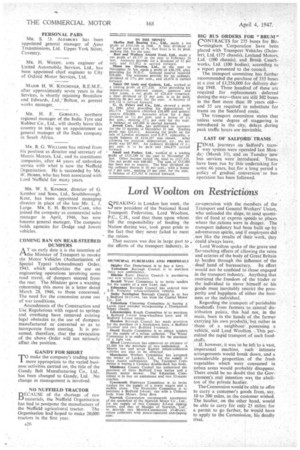Lord Wootton on Restrictions S PEAKING in London last week, the
Page 28

If you've noticed an error in this article please click here to report it so we can fix it.
new president of the National Road Transport Federation, Lord Wootton. P.C., C.H., said that those upon whom fell the responsibility of feeding site Nation during war, look great pride in the fact that they never failed to meet the ration.
That success was due in large part to the efforts of the transport industry, in co-operation with the members of the Transport and General Workers' Union, who unloaded the ships, to send quantities of food at express speeds to places where the rations were in danger. The transport industry had been built up by adventurous spirits, and if employees did not like the results of their work, they could always leave.
Lord Woolton spoke of the grave and far-reaching effects of allowing the veins and arteries of the body of Great Britain to harden through the Mfluence of the
dead hand of bureaucracy. Its effect would not be confined to those engaged in the transport industry. Anything that restricted the freedom of the trader or the individual to move himself or his goods must inevitably restrict the prosperity and happiness of either the business or the individual.
Regarding the transport of perishable foodstuffs from farmers to central distribution points, this had not, in the main, been in the hands of the farmer carrying his own produets," but rather in • those of a neighbour possessing a vehicle, said Lord Wootton. This permitted the rapid transport of such foodstuffs.
If, however, it was to be left to a vast, impersonal machine, such intimate arrangements would break down, and a considerable proportion of the fresh vegetables which were consumed in urban areas would probably disappear. There could be no doubt that the Government's real intention was the aboliton of the private haulier.
The Comnrission would be able to offer to carry a customer's goods from, say, 10 to 200 miles, as the customer wished. The haulier, on the other hand, would be able to carry for only 25 miles; for a permit to go farther, he -Would have to apply to the Commission, his deadly rival.












































































